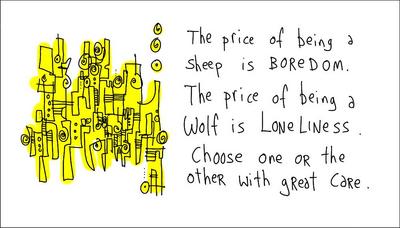This is a scheduled post whilst I’m on holiday in the UAE – my apologies if I don’t respond to comments straight away!
“The most important word on the internet is not “Search”. The most important word on the internet is “Share”. Sharing is the driver. Sharing is the DNA. We use Social Objects to share ourselves with other people. We’re primates. We like to groom each other. It’s in our nature.” (Hugh McLeod)
Sometimes you read things that coalesce previously disparate thoughts you’ve had and package them up in a way that is usable. It’s my hope to do that both here and at Synechism Ltd. (indeed, you can hire me to help you do so with the latter). My favourite writers are those that help me find a lens on my Quinean ‘web of beliefs’ so that I understand both myself and the world I inhabit in ways that are useful.
Hugh McLeod, of gapingvoid cartoons-on-the-back-of-business-cards fame, has evolved from a cartoonist to an excellent writer in the mould of the above. In a recent post, entitled Social Objects are the future of marketing he explains what he means by the term ‘Social Object’ and how such items can connect people.
“Things change because of people interacting with other people, rather than technology or design really doing things to people.” (Mark Earls)
We’re all geeks, points out Hugh, as “we’re all enthusiastic about something outside ourselves” – and those things that make us excited “act as Social Objects within a social network of people who care passionately about the stuff.” He cites the Apple iPhone as an example, but points out that almost anything can serve as one.
What interests me is that Google seem to have recognised that search is almost like a utility: we expect it to be there and work properly. Search, in an of itself, is not very exciting. Where do we share the things we find interesting? Social networks! Is it any surprise, then, that Google+ has emerged? Google earns the majority of its money through advertising and social networking is where the advertising money’s going – just ask Facebook.
So if we want to gain traction with projects such as Purpos/ed* we’d do well to employ the following 5 Principles of Social Objects that Hugh has drawn up:
- You should be able to define the social object your service is built around.
- Define your verbs that your users perform on the objects.
- How can people share the objects?
- Turn invitations into gifts.
- Charge the publishers, not the spectators.
In a world of social networking, people have to have something to talk about to connect them. Stand out from the crowd and stop endlessly re-sharing and retweeting other people’s stuff. Create your own!
Image CC BY-NC Shira Golding
* We’re having a bit of a summer break with Purpos/ed – there’s a cadence to engagement that we want to respect.



